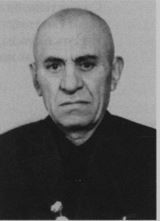Adam Ashurov was born in 1905 in the village of Jarakh (present-day Chere) in southern Dagestan, Russia, in a family of Mountain Jews. In the early 1920s, when Dagestan suffered from the depredations of bandits (Jews were favorite targets of the robbers), the Ashurov family, along with other Mountain Jews, moved to the nearby town of Derbent. In Derbent, Adam’s father Izyahu bought a house and set up a farm. However, in 1929, on the eve of the “dekulakization” campaign, the Soviet authorities seized Ashurov’s farm, and his large family was forced to move into a small and shabby house.
In 1941, when the Soviet-German War began, the 36-year-old Adam Ashurov was drafted into the Red Army. He served with a communication unit of the 761st Rifle Regiment. This was a tough period for the Red Army, and Adam traveled with his regiment from the Rostov-on-Don area to western Russia. In May 1942, his unit was surrounded by the Germans, and Adam was taken prisoner. As a true native of Dagestan, Ashurov spoke not only his mother tongue, Juhuri, but also several other Dagestani languages, in addition to Azerbaijani. Therefore, in the POW camp he was able to pass himself off as a Lezgian Muslim named Adil; the other Lezgian POWs did not betray him. In 1944, when the Red Army approached his POW camp, the able-bodied inmates were transferred to Austria, and Adam found himself in Mauthausen. In May 1945, the camp was liberated by the US Army. Before releasing the inmates, the Americans warned the Soviet POWs that they would be persecuted in the Soviet Union, and suggested that they stay in the West. Ashurov declined the invitation and returned to Russia.
The Americans turned out to be right. Although Ashurov was not arrested immediately upon crossing the Soviet border, a short time later the police in his hometown of Derbent began to summon him for interrogations. Anticipating worse to come, Ashurov would leave his home from time to time and hide in the mountains. Nevertheless, he was arrested and imprisoned, and only the intercession of his brother, Danil Ashurov, a fellow war veteran and the principal of a railroad school in Derbent, saved him from a GULAG sentence. Only after Stalin’s death did the police leave him in peace.
Adam Ashurov had five children, three of whom were born after the war. He died in 1978.







